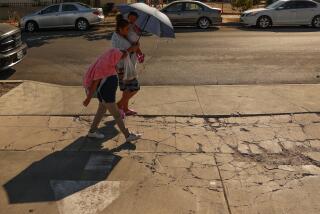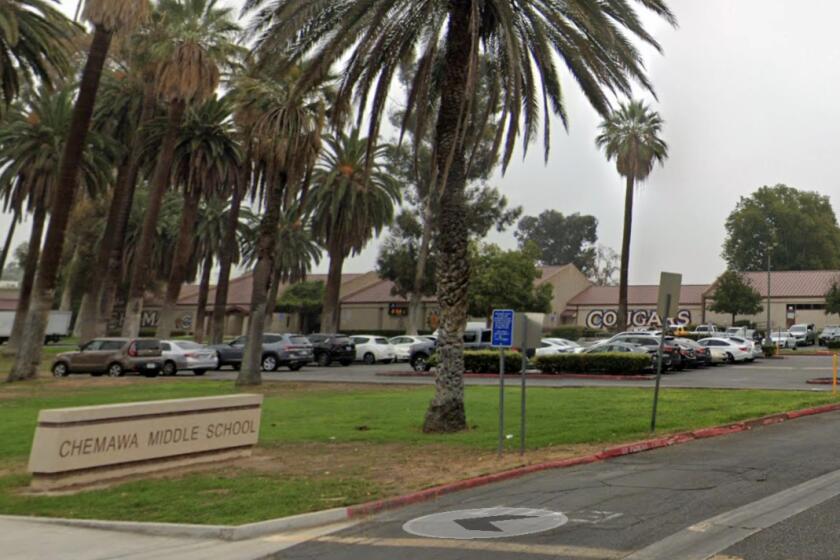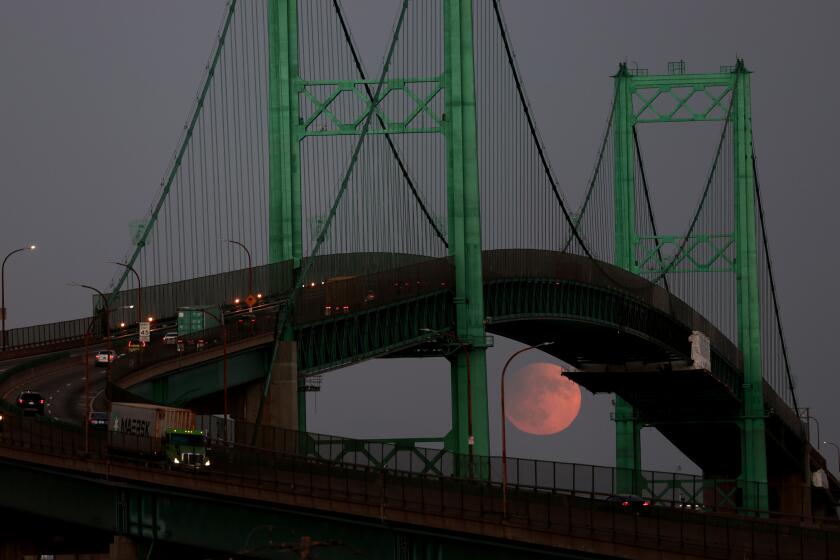Jewish Children and the Holidays : Youngsters Learn Meaning of Christmas and Hanukkah
One day, 4-year-old Benjamin came home from his neighborhood synagogue where he and other preschoolers had met with a rabbi. They learned about Hanukkah and each made a holiday card and a paper menorah.
“That’s a very nice card,” his mother said. “Would you like to send it to Grandma and Grandpa?”
“No,” the little boy replied. “I’ll just leave it outside for Santa Claus.”
Often, young Jewish children are intrigued and confused by the Christmas holiday and its symbols, said Rabbi Jacqueline Koch Ellenson of Kehillath Israel in Pacific Palisades, a Reconstructionist synagogue. The attention paid to Christmas by the general public and the fact that the holiday usually falls within the same month as Hanukkah, contributes to that confusion.
Explaining Christmas
That’s why Ellenson and other rabbis and educators spend time during November and December explaining Christmas to Jewish children.
When doing so, Ellenson said, she tells the children that a man named Jesus lived about 2,000 years ago and that many believed he was God because of certain events attributed to him.
“I might even show them some of the things in the New Testament about Jesus, because the stories are wonderful and the parables are wonderful.”
However, she said it is important for children to know that Jews do not believe that Jesus was God. “God is spiritual and can’t be bound by physical form. There’s not a concept (in Judaism) that God can have a child.”
Ellenson believes that it is educational for children to understand the meaning behind Christmas symbols, but that it is inappropriate to have those symbols in a Jewish home.
“You can’t separate a symbol from the religious roots from which it sprang. I would look at it in the other direction: if a Christian family decided that they . . . were going to celebrate Hanukkah by lighting the candles, or if they were going to have a (Passover) Seder, just because they liked the foods . . . I would feel very insulted. Those are my symbols and they can’t be removed from the religious context in which they were developed. So I think that for a Jewish family to adopt symbols that religious Christians believe are reflective of their values, is an insult (to them).”
Rabbi Neil Comess-Daniels of Temple Shir Shalom in Mar Vista, a Reform synagogue, said: “I don’t think it’s bad for a Jewish child to be intrigued by Santa Claus. If your kid wants to sit on Santa Claus’ lap like every other kid does, I don’t think there’s any harm in that. But I think that it’s important that Jewish parents say, ‘Look, this is going to be fun and what we’re doing is sharing in something that non-Jewish people use as part of their Christmas celebration.’ ”
Feeling the Pressure
Comess-Daniels said he finds that many parents who do not observe Jewish traditions feel pressure to compete with Christmas.
“In fact, that’s so antagonistic to Hanukkah,” he said. “If Hanukkah is a celebration of religious freedom, then why on earth would Jews feel compelled to blur some of the beautiful distinctions between one religion and another?
“When people bow down to the media pressure and peer pressure . . . it destroys the salad bowl versus the melting pot. In a melting pot, we all amalgamate into something and assume that there are no longer any differences. In a salad bowl, we each contribute a flavor to what America is all about. The minute we think that we have to have everything in common, America is in trouble.”
Whether to have a salad bowl or melting pot can also be an issue in interfaith households. “That’s where it has to be 100% honest,” Comess-Daniels said. He suggests that the parent say something like: “ ‘I’m Jewish and Daddy isn’t; so during this time of year, I celebrate Hanukkah and Daddy . . . celebrates Christmas.’ And you tell the child about each holiday. ‘So you can celebrate them both or choose one or neither; if you want to someday, you can make a choice.’ The challenge of that is to include the honesty that Hanukkah is not . . . the magnificent, awesome holiday of Christmas; it’s a minor holiday.”
Rabbi Daniel Gordis of Adat Ari El in North Hollywood, a Conservative synagogue, frequently addresses himself to the questions parents have when they have converted to Judaism. (It is the policy of the Conservative and Orthodox movements not to perform intermarriages.) Often during the holidays, he said, couples face the dilemma of whether to celebrate Christmas with their Christian relatives.
“That’s the question I deal with all the time--all the time. The problem comes up when the couple has children; do they go to the grandparents’ house?” If it’s not going to cause unbearable family strife or tension, he recommends that the Jewish family not join in Christmas celebrations but invite their Christian relatives to celebrate Hanukkah. However, he added, “there’s no hard-and-fast rule.”
Jews can make the same statements during Hanukkah as Christians can during Christmas, but in a very different way, Gordis said.
“We can make a statement about how important our religion is to us. We can make a statement about how much we love each other. Just learning a song together and sitting around the menorah talking about what it means to be Jewish, is meaningful.”
No Problem
Not all Jewish families feel Christmas is an issue. Rabbi Abner Weiss of Beth Jacob Congregation in Beverly Hills, an Orthodox synagogue, feels that children in the Orthodox community “don’t have that kind of problem.”
“In the traditional Jewish calendar, there is only one month that doesn’t have some festival with its own magical symbols. So there isn’t pressure to explain, ‘Oh, sorry, you’re missing out on Christmas.’ ”
What Weiss does find troublesome is the increasing commercialization of both holidays.
“I suspect that . . . Christian clergymen are facing the same problem with their children--how to separate the commercialization of Christmas from its religious core.”
Merchants have also found an untapped resource in gift buying for Hanukkah, the rabbi said. “In New York, which I know much better than California (Weiss has been in California since August), it’s not called Christmas, it’s called Hanukkah-Christmas or Christmas-Hanukkah by the merchants and by the media.”
What would he say to the nonreligious, assimilated Jew who feels that Christmas has become a secular and American holiday?
Responded Weiss: “I would say that this is a very sad thing for the Jewish community and for them. I think that saying it’s an American holiday is a cop-out. At this time of year, there is always . . . someone who’s saying, ‘We have a family that has a Christmas tree and Hanukkah candles.’ I think that people who have a little bit of both end up with nothing of either.”
More to Read
Sign up for Essential California
The most important California stories and recommendations in your inbox every morning.
You may occasionally receive promotional content from the Los Angeles Times.










